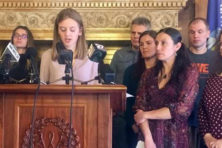State News: CAFOs, Free Speech, Wisconsin-Grown Rice
- Share
- Tweet
- Pin
- Share
Bayfield County, DNR in CAFO Ordinance Talks
Bayfield County officials say they’ve begun formal settlement talks with the Wisconsin Department of Natural Resources over an ordinance that would go beyond state standards for large farms known as concentrated animal feeding operations, or CAFOs.
The two are at odds over the ordinance and were set to defend their positions in Bayfield County Circuit Court on Monday, but settlement discussions postponed the court date.
The county passed its South Fish Creek ordinance last year to protect water quality by placing more restrictions on large-scale farms that locate in the South Fish Creek Watershed, which flows into a bay of Lake Superior. Iowa-based Reicks View Farms has proposed building a farm upstream for 26,000 hogs.
“The Bayfield County Large Scale Livestock Committee worked hard to develop a plan above and beyond the requirements of the DNR to protect our unique water resources and environment,” said Bayfield County Board Chairman Dennis Pocernich in a news release. “I feel the DNR wants to help and support us in this and that’s why I want to support further negotiations before we go to court.”
A DNR spokesman declined to comment on the discussions. The agency has allowed Manitowoc County to go beyond state standards to protect water quality.
A spokesman with Reicks View Farms has declined to weigh in on the county’s ordinance.
Regents Rebuff Campus Speech Resolution
The University of Wisconsin System Board of Regents unanimously approved a resolution at its July 7 meeting affirming the system’s commitment to free speech.
The move comes as Republicans in the state legislature are pushing a bill that could either suspend or eventually expel students who interrupt, heckle or intimidate speakers with whom they disagree.
The regents’ called their resolution a “guidepost” on free expression on campus. The resolution doesn’t contain punitive measures included in the Republican-supported bill that passed the Assembly on a party line vote of 61-36.
Opponents of the Assembly bill, including Democratic state Rep. Chris Taylor, have said it would “gag” students’ First Amendment rights.
Supporters say it is needed in light of disruptions on campuses around the nation, often involving opposition to controversial conservative speakers.
Court Tosses Medical Malpractice Award Cap
A state appeals court has ruled against a Wisconsin law that limits how much an injured patient can get for certain medical malpractice claims.
The case involves Ascaris Mayo, who lost her limbs after doctors didn’t tell her she had a serious infection. She and her husband were awarded $16.5 million but the state’s medical malpractice board reduced it to $750,000, the maximum amount for noneconomic damages under state law.
The 1st District Court of Appeals sided with the plaintiffs, saying the cap is unconstitutional.
Daniel Rottier, the attorney representing the Mayos in the case, praised the ruling for extending beyond his clients to include “all severely and catastrophically injured claimants.”
Rottier said the award limits were unfair to whose who are most injured.
Judge Joan Kessler wrote in the unanimous decision that the caps were unconstitutional on their face, imposing “an unfair and illogical burden only on catastrophically injured patients, thus denying them the equal protection of the laws.”
Lawyers for the state fund have argued that caps on damages help retain doctors and reduce “defensive medicine.”
Biologist Taps Into Wisconsin-Grown Rice
Ninety-five percent of rice produced in the United States is grown under the sunny skies and in the warm weather of California. In the Sacramento Valley, where temperatures often top 100 degrees, acres of land are flooded under about five inches of water where medium-grain rice will be grown.
Enter droughts that have plagued the west coast for several years, and questions about how one of the planet’s thirstiest crops will be sustained start to surface.
For Michael Schläppi, an associate professor of biology at Marquette University, the droughts created room to imagine growing rice in other parts of country where water is plentiful, like the Midwest.
“Why not (grow rice) here in Wisconsin? Why not in a place where we have ample resources of water. And we also have a lot of foggy land that farmers cannot use for wheat, soybean or corn,” he said.
The rice farming effort in Wisconsin doesn’t just end with producing a variety that can tolerate harsh weather. Schläppi said he’s also working with Marquette University’s business and communication departments to tap into a market for Wisconsin rice.
“I can tell you anecdotally that I’ve been approached by local chefs who are really interested in using locally sourced foods, and rice is one of those foods that you can’t get locally in Wisconsin,” he said.
Wisconsin Public Radio, Copyright 2017, Board of Regents of the University of Wisconsin System and Wisconsin Educational Communications Board.

